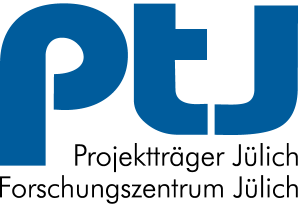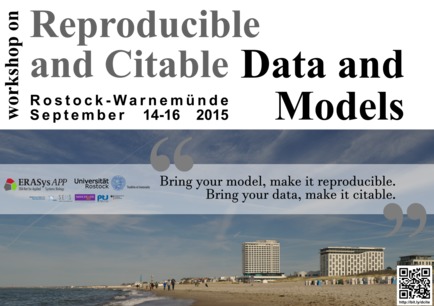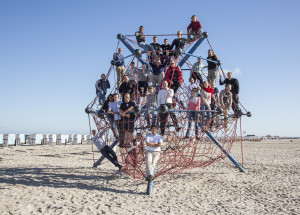This workshop is for computational biologists and experimentalists who wish to learn about standards, citeable data, about how to make scientific results sustainable, available through open repositories, and about how to find and reuse other people’s works. It comprises of a mixture of lectures and hands-on sessions. We will teach you the major standards and tools that support these standards, as well as steps towards encoding and publishing reproducible modeling results. Topics include data identifiers and data identity authorities, licences, public data stores, linking data with publications, how to cite others data, standards for model encoding (SBML, CellML), annotation of model parts with terms from bio-ontologies, and encoding virtual experiments in SED-ML.
Participants are encouraged to bring their own piece of model and put their hands on transforming it into a standard-compliant and publishable piece of research.
Program
| MON 14 SEP | TUE 15 SEP | WED 16 SEP | |
| AM | 09:00 Citation Concerns: Licensing, citation tracking, orcids, sustainability Carole Goble09:30 Hands on Stepping stones to making your data citable (2) Team FAIRDOM |
09:00 The OpenAIRE infrastructure and RDA Data Publishing Working Group: results and vision Paolo Manghi10:30 Hands on Archiving modeling results Finn Bacall, Stuart Owen, Martin Scharm11:30 Ask the experts Panel discussion and reflection over key questions arising in the meeting |
|
| noon | from 12:00 Registration & lunch |
12:00 lunch | 12:30 lunch & goodbye |
| PM | 13:00 Introduction: What do we mean by citable data and reproducible models? Carole Goble, Wolfgang Müller, Dagmar Waltemath14:00 Citing data in research articles: principles, implementation, challenges – and the benefits of changing our ways Johanna McEntyre15:00 Publishing data and code openly Tom Ingraham |
13:30 Standards for reproducibility of model-based results Dagmar Waltemath14:15 Capturing the context – one small(ish) step for modellers, one giant leap for mankind Mihai Glont15:00 Reproducible model construction, validation and simulation Jacky Snoep |
|
| 16:30 Standards, FAIRDOM, the Data Citation Principles and Research Objects Carole Goble17:00 Hands on Stepping stones to making your data citable (1) Team FAIRDOM |
16:30 Hands on Steps towards reproducible modeling results Dagmar Waltemath, Jacky Snoep |
||
| from 18:00 | BBQ (indoors if wet) | Workshop Dinner: Teepott Restaurant |
|
| even later | dancing@Neptun Hotel |
Speakers
Dr Johanna McEntyre (EMBL-EBI, UK) has a PhD in plant biology, was a Staff Scientist at NCBI, National Library of Medicine, NIH, USA, and has been a Team Leader at EMBL-EB I since 2009. She leads EMBL-EBI Literature Services, which runs Europe PubMed Central (Europe PMC). As the scientific literature is increasingly linked to data outputs, one of the key work programs of the Literature Services team is to integrate textual content with databases, in particular with those databases developed at EMBL-EBI, but also more widely through the development of data sharing processes with partner organisations such as OpenAIRE. Jo is an expert in literature – data integration.
Tom Ingraham (F1000, UK) is Publishing Editor and data-lead at the life science-orientated Open Science publishing platform, F1000Research (http://f1000research.com/). Since its launch in 2012, F1000Research has been in the vanguard of the Open Data and Open Source publishing movement, with the aim to enable the wider community to access, analyse, reuse and share these valuable scientific outputs without restriction, and to give due credit to the researchers who worked hard to create them. The potential benefits of publishing raw data and source code are profound and wide-ranging, but there are of course challenges as well. This talk will focus on F1000Research’s motivations, policies and initiatives relating to publishing data and code, touching on topics including our work with repositories, data visualization and living figures, licensing, qualitative assessment of data and code, dealing with sensitive data, ‘1-click’ data submissions, citation and credit.
Carole Goble is the Director of the FAIRDOM project (http://www.fair-dom.org), which is delivering a standards-compliant Systems Biology cataloguing and asset management platform (SEEK4Science), a Community Commons for the assets of Systems Biology projects (FAIRDOMHub) and services for standards, curation and training. She is a member of the Force11 Scholarly Communications initiative, and leads data management activities in the ELIXIR and ISBE Research Infrastructures.
Carole will talk about the FAIRDOM project and platforms and how they can support data citation and model reproducibility for Systems Biology, bridging from the invited talks and the hands on sessions.
Mihai Glont (EMBL-EBI, UK) is the technical coordinator for the BioModels team within the Proteomic Services group at EMBL-European Bioinformatics Institute (http://www.biomodels.org). As part of his Master’s Degree in IT Management for Business, he investigated means of encoding and formal verification for an unconventional computational model inspired from the eukaryotic cell. Prior to joining EMBL-EBI, he worked as a software engineer for a social enterprise.
Mihai’s talk will focus on practical considerations for reproducible and reusable models and data. He will discuss some of the challenges involved in making models reproducible and give an overview of services and procedures developed across different communities to tackle these problems.
Dr. Paolo Manghi (CRS, Italy) is a Researcher in Computer Science at ISTI-CNR, member of the InfraScience research group, software architect for the OpenAIRE data infrastructure and co-chair of the Research Data Alliance Data Publishing Interest Group. OpenAIRE is a large-scale initiative that aims to promote open scholarship and substantially improve the discoverability and reusability of research publications and data.
Dr. Dagmar Waltemath (Universität Rostock, Germany) received her Ph.D. in Computer Science from the University of Rostock, Germany in 2011. Her research interest is in strategies for the management, provenance and integration of model-related data in
systems biology and medicine. Since 2012, Dr. Waltemath is a Junior Research Group Leader in the Dept. of Systems Biology and Bioinformatics at the University of Rostock. Her group focuses on developing methods to reproducibly simulate computational biology models including storing, annotating, searching and retrieving models and model-related data. Dr. Waltemath is also a COMBINE Coordinator and an SBML Editor (http://co.mbine.org).
Dagmar will talk about COMBINE standards and possibilities to enhance the reproducibility of simulation studies in computational biology.
Prof. Jacky Snoep (Stellenbosch University, SA) and his group advocate using a transparent model construction and validation workflow; for this they make all data and model-scripts available in freely accessible data and model management platforms. The data files are annotated excel spreadsheets and the models are available in SBML format (complete model) and Mathematica notebooks (for parameterization of rate equations). The complete data sets for model construction and validation are available. All the simulation figures in the manuscript associated with the model can be directly reproduced with the available scripts and model files.
In his presentation, Jacky will work through the different aspects of 1) model construction; from enzyme kinetics to parameterized ODEs, 2) model validation; sensitivity and robustness analysis to predict network behavior, and 3) model analysis; model simulation, metabolic control analysis, stability analysis. He will illustrate the use of many of the different standards that you have been introduced to during the workshop and that you will use in the afternoon modeling session. These include: SBML, MIRIAM, SED-ML, FAIRDOM-SEEK, RightField, Biomodels, JWS Online, SED-ML. The focus of the presentation is not so much on fancy modelling techniques but more on publishing a transparent and reproducible model construction, validation and simulation workflow.
Confirmed Tutors and Experts
Finn Bacall (University of Manchester)
Martin Golebiewski (HITS gGMBH)
Martin Scharm (University of Rostock)
Natalie Stanford (University of Manchester)
Stuart Owen (University of Manchester)
Registration
Register via Eventbrite. It is free.
Hotel Information
The meeting will take place in the Hotel Neptun.
Seestraße 19
18119 Rostock-Warnemünde
Special room rates are still available:
Single room: 121 EUR
Double room: 199 EUR
Please book via e-mail or call the booking service (+49 381 777 777 7). Always mention “Workshop DCite” with your booking to get the special rates.
Alternatively, there are plenty of other hotel options nearby to choose from. Please book well in advance, as it can still be busy in September.
Any further questions? Write an email to dagmar.waltemath@uni-rostock.de
The workshop is co-organized Carole Goble (University of Manchester), Wolfgang Müller (HITS gGmbH, Heidelberg), and Dagmar Waltemath (University of Rostock).
Spread the word and put up a poster.
Thanks to all attendees for a great meeting!
 |
 |
 |

